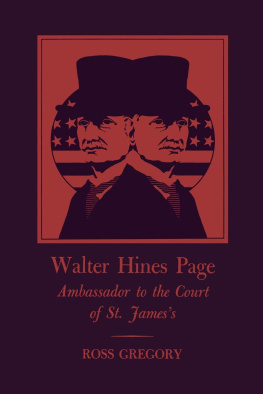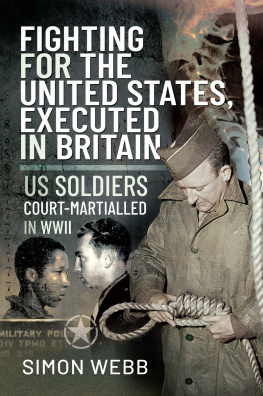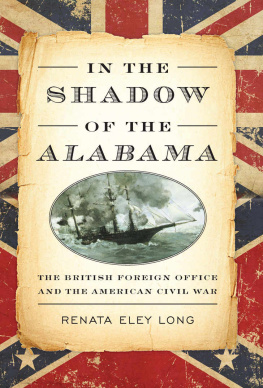Walter Hines Page
Published for the Organization
of American Historians
Ross Gregory
Walter Hines Page
Ambassador to the Court
of St. Jamess
Standard Book Number 8131-1198-6
Library of Congress Catalog Card Number 78-94067
COPYRIGHT 1970 BY THE UNIVERSITY PRESS OF KENTUCKY
A statewide cooperative scholarly publishing agency serving Berea College, Centre College of Kentucky, Eastern Kentucky University, Kentucky State College, Morehead State University, Murray State University, University of Kentucky, University of Louisville, and Western Kentucky University.
Editorial and Sales Offices: Lexington, Kentucky 40506
To Shirley
Contents
Illustrations
President Woodrow Wilson and
Colonel Edward M. House
between
Preface
WHILE WRITERS OF American history like to quote Walter Page, no one wishes to write about him. At least, no substantial work has appeared about this fascinating person since Burton J. Hendrick in the 1920s published The Life and Letters of Walter Hines Page. Doubtless the Hendrick volumes have been the discouraging factor, for they brought literary honor to the author. But this work, for all its success, should not remain the final word on Walter Page. Much a job of editing, these books were not exactly a biography and certainly not an objective history. Hendrick wished readers to remember Page as a significant person in American wartime diplomacy, if not the most important individual in the world at the time. It would have been impossible to write a thorough study of Page in the 1920s. Besides experiencing problems of time and perspective, scholars could examine only a smattering of sources pertaining to the ambassador and his period. Hendrick for the most part had to rely on information in Pages personal papers. Gradually over the years new material has become available, but for full access to manuscript and government collections of the period 19131918, during the ambassadorship of Walter Page, scholars have had to wait until the 1960s, nearly fifty years after the Great War had ended.
This study proposes to retell the story of Walter Pages ambassadorship in light of what seems full availability of sources, to reconsider Pages impact on American diplomacy as well as the impact of that diplomacy on Page. There is no attempt to rehash all aspects of British-American relations, but of course it is necessary to give attention to the major problems, at least those issues in which Page had an interest. While my primary objective is to concentrate on Page, I hope to introduce new material, especially from British Foreign Office collections, to broaden the view of this phase of history, and perhaps contribute to better understanding of foreign policy at the time of the First World War.
I would not have finished this work without assistance from several people, to whom I express deepest gratitude. At the top of the list is Professor Robert H. Ferrell, who gave unselfishly of time and advice to help in matters of style, substance, and other ways too numerous to mention. His assistance truly was indispensable. My friend and colleague Professor Otis K. Rice read portions of the manuscript and offered helpful suggestions. The editors of the Woodrow Wilson Papers, John W. Davidson and David W. Hirst, advised me freely about ways to get into the mass of Wilson Papers. The controller of Her Majestys Stationery Office generously granted permission to use Crown-copyright papers in the Public Record Office, and the American Philosophical Society provided from its Penrose Fund a grant to help support research. Finally, I would like to thank my wife, who read the chapters, made excellent criticisms, and was a constant source of inspiration.
Chapter One
The Road to London
LIKE ALL SOUTHERN lads raised in the second half of the nineteenth century, Walter Page grew up in the shadow of the Civil War. Born in the town his father had founded in north-central North Carolina, he was not quite six years old when Confederate batteries fired the first shots at Fort Sumter. His oldest memories were such tragic sights as soldiers coffins, weeping relatives, the seemingly endless line of bluecoats that filed past his fathers door in pursuit of fleeing rebels. He recalled soldiers camping in the yard, commandeering the property, and rummaging through the house, all of which appeared to the young observer as astonishing and culpable behavior. Invited one day to dine at the officers mess, he retorted: Ill starve before Ill eat with the Yankees. Walter was ten in 1865, the year Shermans troops came by, and only a dozen or so miles from his home, near Durham, the war virtually ended when General Joseph Johnston surrendered his battered Confederate army. Page grew to manhood during the years of Reconstruction, and since part of that time northern troops occupied the state and carpetbaggers ran the government of North Carolina, it was common to hear friends speak of the North as a foreign land and of a Yankee as someone despicable.
For too many years after 1865 northerners and southerners alike were slow to let the Civil War die. Republicans waved the bloody shirt as long as it served their political purposes, and southerners raised the banner of white supremacy, blamed their troubles on black Republicanism, and created myths about the grand historic past. Of the two sections, the South easily was the most depressed by the war. Classical liberalism was the dominant philosophy in the North, and at the center of the creed was the idea that man should have free movement and free thought, even if some men thought the wrong way. Hence the postwar North experienced, besides alarming political corruption and huge economic growth, great educational advance and intellectual creativity. The war did not soon change the mind of the South, at least the minds of many people in the South. To many southerners the northern victory had meant only that the North had more troops and rifles. Voluntary transformation to new thought and behavior would have been a confession that the South had been wrong. Every southern community, including Pages, had its supply of armless or legless veterans, or still more tragic, the widows and fatherless children. The loyal southerner could not admit that these brave heroes had fought for an unworthy cause. The best defense of the southern case seemed veneration of the noble soldiers and retention, as much as possible, of prewar southern society and thought. As Page later explained about his old home: the school, like the war and the church was an institution; and I learned... at... early age, that nobody tells the truth about institutions. While the postwar North awakened to numerous new ventures, the South, attempting to perpetuate false virtues, slumbered in economic backwardness and intellectual conformity.
At least, such was what the southern environment came to seem to Walter Page, and no less than most individuals he long felt the influence of the old home. Convinced that in old habits it was destined to a subordinate, colonial position, Page spent a major portion of his life trying to change the South. Unsuccessful at home, he went north and continued the campaign. The South helped form Pages mind and also his career. It provided a theme for his path to literary success; it drew him into friendship with another southerner who thought similarly and who would appoint Page to high diplomatic office. A man with Pages talent and initiative eventually would have found distinction in some vocation; his career what it was, the southern background helped.









